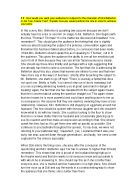How would you want anaudience to respond to the character of Natasha in Act 2 of the play? Explainhow you would perform the role to achieve your needs
Katie Jackson 12MH
How would you want an audience to respond to the character of Natasha in Act 2 of the play? Explain how you would perform the role to achieve your needs
Evidently there is a progression from Natasha’s timid, under-confident and harmless character in Act I, “I’m ashamed of myself, I don’t know what’s wrong with me”, to a much more dominant, controlling and austere personality in Act II, “So coarse! So lacking in breeding”. I believe that it is important to highlight this progression, but I would choose to introduce the further layers of Natasha’s character subtly as an on going process. This is due to the fact that in the construction of ‘Three Sisters’, Chekhov used Zola’s ideas of naturalism as his basis, thus representing the world of the sisters as a distillation of ‘real life’. The naturalistic style in which Chekhov chose to use demands a character that changes in relation to the events happening and therefore in performing the role of Natasha I would emphasize her change in a subtle manner as in real life people don’t change dramatically over night from one characteristic to another. Thus, I don’t want the audience to respond by changing their perception of Natasha between the two acts dramatically but to encounter several stages of emotions towards her.
In Act I I believe that there is a definite social distinction between Natasha and the three sisters as blatantly Natasha doesn’t fit in and is alienated in their environment in which the sisters “were making me a laughing stock”. It is clear that Natasha had not done anything to deserve this treatment and therefore the audience would respond to her character sympathetically and in pity of her situation. As this play is naturalistic, portraying life ‘in it’s purest form’, although Natasha becomes much more dominant in Act II, I aim to keep a small sense of pity still with her character as in line with naturalism, characters aren’t stereotypically ‘good’ or ‘evil’ and therefore in presenting Natasha as believable as possible I don’t want the audience to just feel ‘sympathetic’ or ‘hostile’ but certain degrees of both.
Regarding social context, Natasha is living in a male dominated society in which patriarchy prominently exists with women socially powerless and often inactive in the world without male company. It is therefore unconventional that in Act II Natasha appears to be dominating and instructive towards her husband Andrey. “You’ve got to keep a sharp look out to stop anything happening”, in delivering thus line I would walk over directly to Andrey and keep firm eye contact with him to evoke my confidence and stern manner. I would emphasize the words ‘sharp’ and ‘anything’ and raise my eye brows whilst widening my eyes to highlight the importance of my demand. This contrasts with the way in which Natasha was in Act I and therefore the audience should begin to question the development of her character and be quite confused as to why she is acting as severely towards her husband. Perhaps this could indicate to the audience that Natasha has taken firm control of the household and no longer respects her husband. I believe that it would be effective to portray Natasha’s dominance to the audience through the difference of height between her and Andrey; however symbolism doesn’t fit in with the concept of naturalism. Therefore in delivering the line, “Who lit it? – I still haven’t got to the bottom of that”, I would use my body to overpower Andrey by placing my shoulders firmly back, with a straight back and my head held high looking downwards over my nose to him. I would use a high pitch to create a ‘shriek’ tone, almost intimidating Andrey, allowing the audience to recognise my impatient, questioning behaviour. The audience in response to the way in which Natasha acknowledges her husband should begin to contain a degree of shock as this would be an extremely unconventional way of treating your husband in this period and the audience should expect him to react firmly due to the way in which men generally overpowered women.







